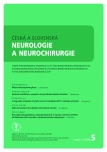Consecutive low-flow and high-flow EC-IC bypass in ischemia prevention during internal carotid artery sacrifice in intracavernous aneurysm
Authors:
V. Přibáň; J. Dostál
; I. Holečková; J. Mraček
Authors‘ workplace:
Neurochirurgická klinika LF UK a FN Plzeň
Published in:
Cesk Slov Neurol N 2020; 83/116(5): 563-565
Category:
Letter to Editor
doi:
https://doi.org/10.14735/amcsnn2020563
Sources
1. Standard SC, Ahuja A, Guterman LF et al. Balloon test occlusion of the internal carotid artery with hypotensive challenge. AJNR Am J Neuroradiol 1995; 16 (7): 1453–1458.
2. Matsukawa H, Miyata S, Toshiyuki T et al. Rationale for graft selection in patients with complex internal carotid aneurysms treated with extracranial to intracranial high-flow bypass and therapeutic internal carotid artery occlusion. J Neurosurg 2018; 128 (6): 1753–1761. doi: 10.3171/2016.11.JNS161986.
3. Abouakais R, Verbraeken B, Leclerc X et al. Protective STA-MCA bypass to prevent brain ischemia during high-flow bypass surgery: case series of 10 patients. Acta Neurochir 2019; 161 (6): 1207–1214. doi: 10.1007/s00 701-019-03906-4.
4. Sia SF, Lai L, Morgan MK. Measuring competence development for performing high flow extracranial-to-intracranial bypass. J Clin Neurosci 2013; 20 (8): 1083–1088. doi: 10.1016/j.jocn.2012.10.019.
5. Nussbaum ES, Kallmes MA, Lassig JP et al. Cerebral revascularization for the management of complex intracranial aneurysms: a single-center experience. J Neurosurg 2018; 1: 1–11. doi: 10.3171/2018.4.JNS172752.
6.Matsukawa K, Tanikawa R, Kamiyama H et al. Risk factors for low-flow related ischemic complications and neurological worsening in patients with complex internal carotid artery aneurysms treated by EC-IC high-flow bypass. World Neurosurg 2016; 85: 49–55. doi: 10.1016/j.wneu.2015.09.095.
7. Cherian J, Srinivasan V, Kan P et al. Double-barrel superficial temporal artery bypass: ca nit be considered „high-flow?“ Oper Neurosurg 2018; 18: 288–294. doi: 10.1093/ons/opx119.
8. Amin-Hanjani S, Alaraj A, Charbel FT. Flow replacement bypass for aneurysms: decision-making using intraoperative blood flow measurement. Acta neurochir 2010; 152 (6): 1021–1032. doi: 10.1007/s00701-010-0635-
9. Vajkoczy P, Korja M, Czabanka M et al. Experience in using the excimer laser-assisted nonocclusive anastomosis bypass technique for high-flow revascularization: Mannheim-Helsinki series of 64 patients. Neurosurgery 2012; 70 (1): 49–54. doi: 10.1227/NEU.0b013e31822cb979.
10. Kim BD, Ver Halen JP, Grant DW et al. Anesthesia duration as an independent risk factor for postoperative complications in free flap surgery: a review of 1,305 surgical cases. J Reconstr Microsurg 2014; 30 (4): 217–226. doi: 10.1055/s-0033-1358382.
Labels
Paediatric neurology Neurosurgery NeurologyArticle was published in
Czech and Slovak Neurology and Neurosurgery

2020 Issue 5
Most read in this issue
- Diffuse low grade gliomas
- Respiratory rehabilitation in patients with amyotrophic lateral sclerosis
- Amnesia Light and Brief Assessment (ALBA) test – the second version and repeated examinations
- Neurorehabilitation in patients with amyotrophic lateral sclerosis
